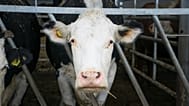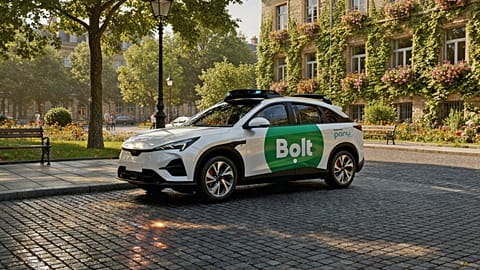A cohort of young, environmentally conscious people labelled ‘AI vegans’ is leading the charge against ChatGPT and other forms of generative AI.
A competition on the video game Warframe was the final straw for Bella.
 ADVERTISEMENT
ADVERTISEMENT
 ADVERTISEMENT
ADVERTISEMENT
Everyone in her gaming team had been given just three days to submit their own artwork. Nervous about the tight deadline, she remained undeterred - until the contest accepted a piece of artificial intelligence (AI)-generated art.
“If AI hadn't been accepted into the contest, maybe I would have tried to compete, but this time it seemed like a humiliation to me: competing with a person who hadn't put a single drop of effort into this image,” the 21-year-old from the Czech Republic told Euronews Next.
“One of the reasons I stopped using generative AI is that it's morally wrong. If I, as an artist, continued to use it, it would be a kind of betrayal. Like, I spent years learning and improving my skills myself, and here I am using something that steals the results of the work of others like me”.
Bella is one of a growing number of ‘AI vegans’, a new name for those choosing to abstain from all generative AI, systems that are trained on vast data sets to create text, images, music and more.
It’s a movement that has been steadily growing since the launch of OpenAI’s ChatGPT in 2022, with the anti-AI community on Reddit amassing more than 71,000 members.
Similar to veganism, the reasoning is mostly ethical and environmental.
Even a short conversation with ChatGPT can guzzle the equivalent of a bottle of water, according to a 2023 study. The technology’s scraping of creative works has led to famous artists, authors, filmmakers and musicians uniting in protest.
“[Generative AI] constantly steals without consent from absolutely everything, violates privacy, and obtains money from it,” Marc, a 23-year-old AI abstainer based in Spain , told Euronews Next.
“It's a tool of capitalism to maintain worker exploitation or even bring it up to the next level”.
Alongside these concerns lurks a deeper fear of how AI could be harming our mental health and cognitive development, creating a dependence on fast solutions that rob us of critical thinking.
A recent, small-scale studyby the Massachusetts Institute of Technology (MIT) backs this up, reporting that its participants who used ChatGPT to write essays recorded lower brain engagement than those who did not use the tool.
The ChatGPT users also struggled to quote from what they had just created, and showed underperformance at “neural, linguistic, and behavioural levels," the study found.
This could have larger implications on learning, confidence, and how humans utilise AI in important settings, according to Nataliya Kosmyna, co-author of the study and research scientist at MIT Media Lab's Fluid Interfaces group.
“If a person doesn’t really remember what they just wrote, they do not feel ownership, so it ultimately means that they don't really care about it. So, what if this is not just a lab experiment? What if it is a real situation, like, you know, a life and death situation? Some jobs require that”.
For Lucy, a 22-year-old ‘AI vegan’ from Spain, her concerns centre around certain chatbots’ tendencies towards sycophancy, which can lead to the validation of delusional - and sometimes dangerous - ideas.
“I feel like the digital era already brought about a lot of stupidity simply because people misuse the internet and phones, instead of using them to learn stuff. But having people be dumb while the chatbots tell them how right and brilliant they are? That's worrying,” she said.
The difficulties of AI abstinence
Generative AI has been developing at a rapid pace, infiltrating jobs, education, social media apps and even our relationships. This has made it increasingly challenging for people to avoid.
“You need to have a strong mentality, but I have managed,” said Marc, who used to work in AI cybersecurity.
“It is especially complicated to stay out of it in university, for example, when most students, and even teachers, use it regularly for everything,” he said, adding that it’s also created a divide with his family, who are “addicted to the simplification” of AI.
Lucy is also “heavily encouraged” to use AI at her internship for a graphic design company - despite its often questionable results.
“Recently, a client asked us to animate their AI assistant (a very ugly drawing of a woman with all the glossy ugliness of AI). So we’re struggling with that, because the video AI gives her huge hands and stuff. Very uncanny valley,” she said.
But even when our professional lives require us to use the technology, Kosmyna believes we should maintain the right to choose when and how it’s used - exercising those rights with careful consideration.
“Do I interact with it because of my work, running studies? Yeah, absolutely. Do we investigate when a new feature appears, for example, or [when] a new claim appears? Yes. But using it for any other personal use cases or professional use? Personally, I don't see the need to have it,” she said.
“Some of the [generative AI] use cases, of course, are very interesting and more interesting than others. But I don't need to burn seven trees and seven gallons of water to rewrite an email,” she said.
Can AI ever be ethical?
For most ‘AI vegans’, the core belief is that AI is fundamentally unethical.
While Marc thinks its use should be “banned and punished by law”, others remain proponents of tighter regulations that prioritise moral practices over profit.
“AI can totally be ethical if the training material is ethically sourced and they don't use exploited Kenyan workers for it,” Lucy said.
“The energy cost will most likely be crazy anyway, but I won't deny I have some hobbies that are very energy-consuming or polluting anyway, like gaming, shopping for stuff overseas for collecting and stuff like that”.
At a time when age restrictions are being implemented across social media platforms in certain countries, with Australia passing a ban for under-16s, Kosmyna thinks generative AI should be treated similarly.
“I do think that it should be absolutely prohibited for minors. And by minors, I mean, everyone who is at school until the age of 18,” she said, adding: “And in learning environments, it should not be forced on you”.
As we continue to navigate AI embedding itself into our lives, there’s at least a comforting reminder from those choosing to abstain: the awe of reality is unmatched.
“AI is so repetitive and surface-level,” Lucy said. “Once the novelty wears off, you notice just how good human entertainment is compared to that”.
The ‘AI vegans’ quoted in this article agreed to speak to Euronews Next about their experiences of abstaining from AI, but did not want their real names to appear in print for privacy.

















